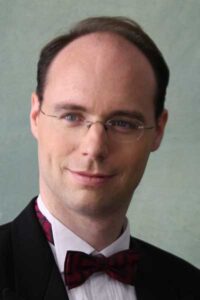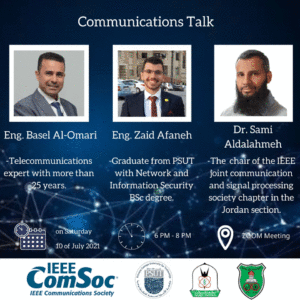Engineering Student Branch Congress (ESBC) 2021
Location: Yarmouk University
Date: 30 October 2021
Abstract:
The IEEE Jordan joint ComSoc & SPS chapter was invited to the ESBC to discuss the membership benefits of the ComSoc & SPS chapters.
Distinguished Lecture:
Is NOMA Efficient for Multi-Antenna Systems
Location: Zoom
Date: 9 September 2021
Abstract:
In the past few years, a large body of literature has been created on downlink Non-Orthogonal Multiple Access (NOMA), employing superposition coding and Successive Interference Cancellation (SIC), in multi-antenna wireless networks. Furthermore, the benefits of NOMA over Orthogonal Multiple Access (OMA) have been highlighted. In this talk, we take a critical and fresh look at the downlink Next Generation Multiple Access (NGMA) literature. Instead of contrasting NOMA with OMA, we contrast NOMA with two other multiple access baselines. The first is conventional Multi-User Linear Precoding (MU–LP), as used in Space-Division Multiple Access (SDMA) and multi-user Multiple-Input Multiple-Output (MIMO) in 4G and 5G. The second, called Rate-Splitting Multiple Access (RSMA), is based on multi-antenna Rate Splitting (RS). It is also a non-orthogonal transmission strategy relying on SIC developed in the past few years in parallel and independently from NOMA. We show that there is some confusion about the benefits of NOMA, and we dispel the associated misconceptions.
Speaker’s Bio:
Bruno Clerckx is a (Full) Professor, the Head of the Wireless Communications and Signal Processing Lab, and the Deputy Head of the Communications and Signal Processing Group, within the Electrical and Electronic Engineering Department, Imperial College London, London, U.K. He received the M.S. and Ph.D. degrees in applied science from the Université Catholique de Louvain, Louvain-la-Neuve, Belgium, in 2000 and 2005, respectively. From 2006 to 2011, he was with Samsung Electronics, Suwon, South Korea, where he actively contributed to 4G (3GPP LTE/LTE-A and IEEE 802.16m) and acted as the Rapporteur for the 3GPP Coordinated Multi-Point (CoMP) Study Item. Since 2011, he has been with Imperial College London, first as a Lecturer from 2011 to 2015, Senior Lecturer from 2015 to 2017, Reader from 2017 to 2020, and now as a Full Professor. From 2014 to 2016, he also was an Associate Professor with Korea University, Seoul, South Korea. He also held various long or short-term visiting research appointments at Stanford University, EURECOM, National University of Singapore, The University of Hong Kong, Princeton University, The University of Edinburgh, The University of New South Wales, and Tsinghua University.
He has authored two books on “MIMO Wireless Communications” and “MIMO Wireless Networks”, 200 peer-reviewed international research papers, and 150 standards contributions, and is the inventor of 80 issued or pending patents among which 15 have been adopted in the specifications of 4G standards and are used by billions of devices worldwide. His research area is communication theory and signal processing for wireless networks. He has been a TPC member, a symposium chair, or a TPC chair of many symposia on communication theory, signal processing for communication and wireless communication for several leading international IEEE conferences. He was an Elected Member of the IEEE Signal Processing Society SPCOM Technical Committee. He served as an Editor for the IEEE TRANSACTIONS ON COMMUNICATIONS, the IEEE TRANSACTIONS ON WIRELESS COMMUNICATIONS, and the IEEE TRANSACTIONS ON SIGNAL PROCESSING. He has also been a (lead) guest editor for special issues of the EURASIP Journal on Wireless Communications and Networking, IEEE ACCESS, the IEEE JOURNAL ON SELECTED AREAS IN COMMUNICATIONS, the IEEE JOURNAL OF SELECTED TOPICS IN SIGNAL PROCESSING, and the PROCEEDINGS OF THE IEEE. He was an Editor for the 3GPP LTE-Advanced Standard Technical Report on CoMP. He is an IEEE ComSoc Distinguished Lecturer 2021-2022.
Communications Talk
Location: Zoom
Date: 10 July 2021
Abstract:
This virtual meeting hosted students from Jordan University, Yarmouk University and Princess Sumaya University for Technology along with speakers from academia and industry to discuss the future of communication. We have seiszed this opportunity to promote the ComSoc & SPS memberships.
Deep Learning: A Signal Processing Perspective
Location: Zoom!
Date: 22 March 2021
Abstract:
The signal processing (SP) landscape has been enriched by recent advances in artificial intelligence (AI) and machine learning (ML), especially since 2010 or so, yielding new tools for signal estimation, classification, approximation, and manipulation. Layered signal representations, nonlinear function approximation, and nonlinear signal prediction are now feasible at very large scale in both dimensionality and data size. These are leading to significant performance gains in a variety of long standing problem domains (e.g., speech, vision), as well as providing the ability to construct new classes of nonlinear functions (e.g., fusion, nonlinear filtering). In this talk we look at the rapid evolution of signal processing tools and techniques, their strengths and weaknesses, and consider emerging frontiers. From a fundamental SP perspective, open questions include robustness, adaptivity, and performance analysis. Embedding the new techniques into emerging architectures will very likely provide new systems-level solutions for a variety of applications, taking advantage of their strengths while surmounting inherent weaknesses.
Speaker’s (short) Bio:
 Brian M. Sadler was an IEEE Signal Processing Society Distinguished Lecturer for 2017-2018, and is an IEEE Communications Society DL for 2020-2021. He is the Army Senior Scientist for Intelligent Systems at the Army Research Laboratory (ARL) in Adelphi, MD, is a Fellow of ARL, and a Fellow of the IEEE. He has been an associate or guest editor for a variety of journals including the IEEE Transactions on Signal Processing, EURASIP Signal Processing, IEEE SP Letters, IEEE SP Magazine, IEEE Transactions on Robotics, International Journal of Robotics Research, and Autonomous Robots. He received Best Paper Awards from the IEEE Signal Processing Society in 2006 and 2010, several ARL and Army R&D awards, and a 2008 Outstanding Invention of the Year Award from the University of Maryland. His research interests include information science, networked and autonomous systems, human-machine teaming, sensing, and mixed-signal integrated circuit architectures, and he has 450 publications in these areas with more than 16,800 citations and h-index of 55.
Brian M. Sadler was an IEEE Signal Processing Society Distinguished Lecturer for 2017-2018, and is an IEEE Communications Society DL for 2020-2021. He is the Army Senior Scientist for Intelligent Systems at the Army Research Laboratory (ARL) in Adelphi, MD, is a Fellow of ARL, and a Fellow of the IEEE. He has been an associate or guest editor for a variety of journals including the IEEE Transactions on Signal Processing, EURASIP Signal Processing, IEEE SP Letters, IEEE SP Magazine, IEEE Transactions on Robotics, International Journal of Robotics Research, and Autonomous Robots. He received Best Paper Awards from the IEEE Signal Processing Society in 2006 and 2010, several ARL and Army R&D awards, and a 2008 Outstanding Invention of the Year Award from the University of Maryland. His research interests include information science, networked and autonomous systems, human-machine teaming, sensing, and mixed-signal integrated circuit architectures, and he has 450 publications in these areas with more than 16,800 citations and h-index of 55.
We thank Mr. Sadler for permitting us to publish the video of the talk. Enjoy!






